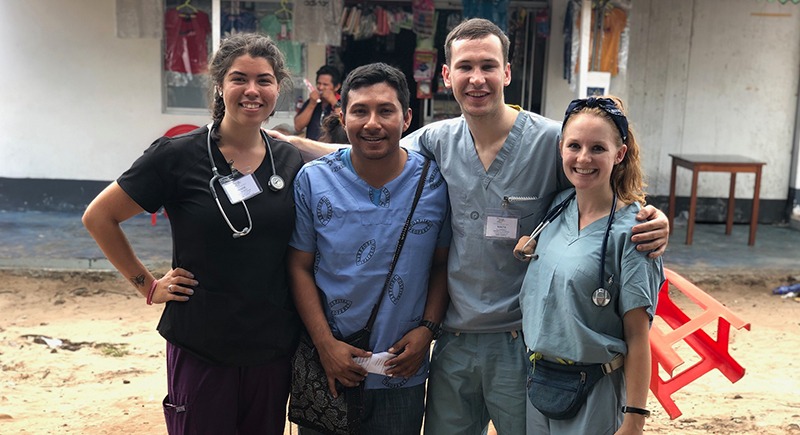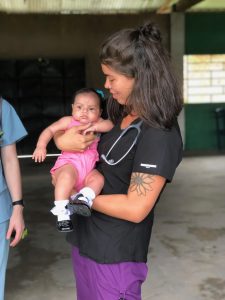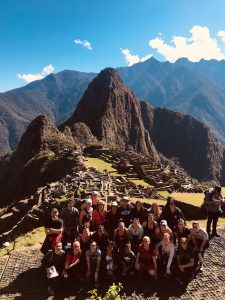
September 16, 2019 Nursing students provide medical care to remote communities in Peru
By Maegan Murray, WSU Tri-Cities
RICHLAND, Wash. – From her first semester in the Washington State University Tri-Cities nursing program, Kenzie McNeel knew she wanted to do something special with her senior clinical rotation experience.

Kenzie McNeel holds an infant while completing her a clinical rotation at a remote village in Peru.
Shortly after transferring from another university in Washington state, she learned of the opportunity to complete her senior clinical experience in remote villages in Peru via a faculty-led program over the summer. There, she would work with other nursing and pharmacy students across the WSU university system to provide care to individuals that may otherwise not have access to medical resources.
The WSU College of Nursing partners with a nonprofit organization known as the “People of Peru Project” each summer for the opportunity, which is run by Paul Opp, from Washington state.
“I have been planning for it since that first semester,” McNeel said. “I knew it would provide experiences that would help prepare me for a future career as a nurse, but it would also allow me to provide much needed services to remote communities that, without volunteers, otherwise may not see that care. ”
Applying skills from the classroom to the real-world
McNeel was one of three students from WSU Tri-Cities to attend the faculty-led trip, with the others being Nikita Fisenko and Sarah Miller, who joined several nursing students from WSU Spokane.
The soon-to-be nurses learned on the fly, providing immediate medical care to patients, medical education, observed how medical care was performed at a residence housing HIV patients, completed medical tests and performed community assessments where they identified resources available for individuals in that community and what could be added.
As a team, they bonded with each other as students and future nurses. McNeel said she enjoyed getting to know students from throughout the WSU system that she had only interacted with through remote classes via video conferencing.
The students also learned a lot about how to survive under difficult circumstances.
Adaptability, McNeel said, was one of the greatest things she personally learned. Often times, the students were in a tented shelter without walls or windows, had to carry in all of their supplies and had to cope with only having certain amount of medications, tools and time to help all of their patients for the day. The group could see an average of 100-150 patients in a single day.
“Often times, we didn’t know what we were going to be doing that day, or even much about the community we were going to, but we had to use our skills to the best of our ability to provide the best medical care possible,” she said. “These communities didn’t have the luxuries of medical access like we do here in the United States.”
Experiencing the culture and living of Peru

WSU nursing and pharmacy students pose for a photo at Machu Picchu.
In addition to applying their medical skills to help individuals in the remote communities, the students also had the opportunity to learn more about the culture, ways of life and complete sight seeing excursions while in Peru.
The students toured local nursing schools, a local hospital, a special needs school and a deaf school. They went on nature walks through the jungle where they saw spiders the size of their faces, swam in the Amazon River, stopped in a monkey sanctuary and visited Machu Picchu. And they had the opportunity to chat with locals about their experiences in their community and handed out toys to the local children.
“I honestly never thought I would have this experience growing up, and especially as a nursing student,” she said. “It was truly incredible.”
Using what she learned abroad for future as a nurse

Kenzie McNeel poses for a photo with an alpaca while studying in Peru with the WSU College of Nursing.
Heading into the future, McNeel hopes to go into labor and delivery where she looks forward to bringing new life into the world.
And while she and her fellow nursing students did not get to witness any births while in Peru, they supplied prenatal and breastfeeding education. McNeel said she will also continue to use the foundational skills she learned and cultivated during her time in South America.
“Here, things go more according to plan and we have the tools to really support patients, but I have the confidence now to know that I can face those complications head on,” she said.
She said she also hopes to one day return to Peru to continue helping with the project, even on a short-term basis.
“While we were there, there was a nurse volunteering that did the program through WSU Spokane – she was there for 6 weeks,” she said. “I want to do that, as well … I definitely recommend this experience to other students who are pursuing a career in nursing. It was an amazing experience.”





